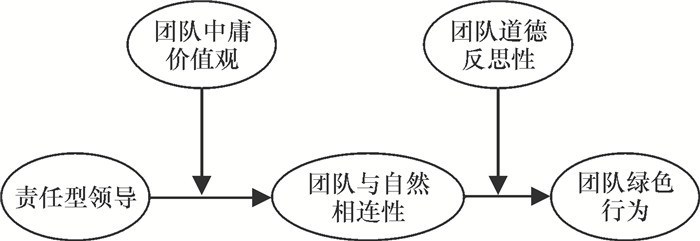On the Influence of Responsible Leadership on Team Green Behavior and Its Mechanism: Based on the Affective Events Theory
-
摘要: 基于情感事件理论,探讨责任型领导与团队绿色行为关系的内在机制与边界条件,并运用珠三角地区制造企业53个工作团队的多来源、多时点调查数据进行实证分析。结果显示:责任型领导可以激发团队绿色行为;团队与自然相连性这一团队积极情感体验在责任型领导与团队绿色行为之间起正向传导作用;团队中庸价值观对责任型领导与团队与自然相连性关系起负向调节作用,团队道德反思性对团队与自然相连性与团队绿色行为关系起正向调节作用;当团队拥有弱中庸价值观和强道德反思性时,责任型领导通过团队与自然相连性正向影响团队绿色行为的间接效应最强。以上结论对企业管理者有效塑造责任型领导并运用之激发团队绿色行为的管理实践具有重要启示。Abstract: Based on the affective events theory, the paper investigates the internal mechanism and its boundary conditions between responsible leadership and team green behavior, makes an empirical analysis by using a multi-source and multi-wave investigation on 53 work teams from manufacturing companies in the Pearl River Delta. Statistical results demonstrate that responsible leadership promotes team green behavior; connectivity between team and nature, a kind of team positive affective experience, mediates the relationship between responsible leadership and team green behavior; the value of team Mean had a negative moderating effect on the relationship between responsible leadership and the connectivity between team and nature, and team moral reflectiveness had a positive moderating effect on the connectivity between team and nature and team green behavior; the indirect effect of responsible leadership on team green behavior is the most significant through connectivity between team and nature when the team has weak values of the Mean and strong moral reflectiveness. The aforesaid findings can provide important practical implications for improving the management practice of cultivating managers' responsible leadership and utilizing it to promote team green behavior in enterprises.
-
表 1 主要变量的均值、标准差和简单相关系数
变量 均值 标准差 1 2 3 4 5 6 7 8 9 团队规模 9.057 4.955 团队任期 1.549 0.969 -0.015 所属企业 0.943 0.233 0.169 0.269* 团队对公司社会责任感知 3.717 0.380 0.017 0.201 0.354*** (0.826) 责任型领导 3.522 0.545 -0.087 0.066 0.113 0.551*** (0.882) 团队与自然相连性 3.880 0.331 0.069 0.096 0.089 0.245* 0.488*** (0.867) 团队中庸价值观 3.828 0.346 0.000 -0.114 0.057 0.378*** 0.325** 0.376*** (0.895) 团队道德反思性 3.616 0.408 0.142 0.201 0.349** 0.403*** 0.449*** 0.574*** 0.194 (0.888) 团队绿色行为 3.717 0.632 -0.142 -0.042 0.150 0.080 0.371*** 0.403*** 0.170 0.266* (0.850) 注:* * *、* *和*分别表示在1%、5%和10%的水平上显著,表 2同;括号内的数字表示Cronbach α信度系数;N=53。 表 2 回归模型的非标准化系数估计值及其标准误
变量 模型1 模型2 模型3 模型4 模型5 团队绿色行为 团队与自然相连性 团队绿色行为 团队与自然相连性 团队绿色行为 常数 2.936(0.825)*** 2.842(0.420)*** 1.259(1.117) 0.051(0.494) 4.538(0.884)*** 控制变量 团队规模 -0.018(0.017) 0.008(0.009) -0.022(0.016) 0.008(0.008) -0.014(0.015) 团队任期 -0.058(0.088) 0.025(0.045) -0.073(0.086) 0.029(0.043) -0.206(0.088)** 所属企业 0.620(0.391) 0.020(0.199) 0.608(0.377) 0.025(0.184) 0.698(0.357)* 团队对企业社会责任感知 -0.399(0.277) -0.060(0.141) -0.364(0.268) -0.044(0.144) -0.318(0.246) 自变量 责任型领导 0.547(0.182)*** 0.321(0.093)*** 0.357(0.197)* 0.305(0.087)*** 0.297(0.182) 中介变量 团队与自然相连性 0.590(0.276)** 0.851(0.296)*** 调节变量 团队中庸价值观 0.176(0.133) 团队道德反思性 -0.071(0.244) 交互项 责任型领导×团队中庸价值观 -0.475(0.215)** 团队与自然相连性×团队道德反思性 1.912(0.567)*** R2 0.213 0.257 0.284 0.393 0.432 F 2.550** 3.256** 3.047** 4.165*** 4.174*** 注:括号中的数值代表标准误;对自变量、中介变量和调节变量的调节效应分析均进行了总平均数中心化处理;N=53。 -
[1] 汤敏慧, 彭坚. 绿色变革型领导对团队绿色行为的影响: 基于社会认知视角的本土探索[J]. 心理科学, 2019(6): 1478-1484. https://www.cnki.com.cn/Article/CJFDTOTAL-XLKX201906029.htm [2] 杨晓彤, 周琼瑶. 责任型领导对员工绿色行为的影响: 道德反思的中介作用及同理心的调节作用[J]. 上海管理科学, 2020(1): 96-102. doi: 10.3969/j.issn.1005-9679.2020.01.017 [3] 邢璐, 林钰莹, 何欣露, 等. 理性与感性的较量: 责任型领导影响下属绿色行为的双路径探讨[J]. 中国人力资源开发, 2017(1): 31-40. https://www.cnki.com.cn/Article/CJFDTOTAL-ZRZK201701006.htm [4] WEISS H M, CROPANZANO R. Affective events theory: a theoretical discussion of the structure, causes and consequences of affective experiences at work[J]. Research in Organizational Behavior, 1996, 18(1): 1-74. http://psycnet.apa.org/psycinfo/1996-98665-001 [5] PIROLA-MERLO A, HARTEL C, MANN L, et al. How leaders influence the impact of affective events on team climate and performance in R & D teams[J]. Leadership Quarterly, 2002, 13(5): 561-581. doi: 10.1016/S1048-9843(02)00144-3 [6] WHITBURN J, LINKLATER W, ABRAHAMSE W. Meta-analysis of human connection to nature and pro-environmental behavior[J]. Conservation Biology, 2019, 34(1): 180-193. doi: 10.1111/cobi.13381 [7] DASBOROUGH M T, ASHKANASY N M, TEE H E Y J, et al. What goes around comes around: how meso-level negative emotional contagion can ultimately determine organizational attitudes toward leaders[J]. Leadership Quarterly, 2009, 20(4): 571-585. doi: 10.1016/j.leaqua.2009.04.009 [8] 黄金兰, 林以正, 杨中芳. 中庸信念——价值量表之修订[J]. 本土心理学研究, 2012(1): 3-41. [9] KIM A, KIM Y, HAN K, et al. Multilevel influences on voluntary workplace green behavior: individual differences, leader behavior, and coworker advocacy[J]. Journal of Management, 2017, 43(5): 1335-1358. doi: 10.1177/0149206314547386 [10] MAAK T, PLESS N M. Responsible leadership in a stakeholder society—a relational perspective[J]. Journal of Business Ethics, 2006, 66(1): 99-115. doi: 10.1007/s10551-006-9047-z [11] 宋继文, 孙志强, 蔚剑枫, 等. 责任型领导与企业社会资本建立: 怡海公司案例研究[J]. 管理学报, 2009(7): 988-994. doi: 10.3969/j.issn.1672-884X.2009.07.025 [12] AFSAR B, MAQSOOM A, SHAHJEHAN A, et al. Responsible leadership and employee's pro-environmental behavior: the role of organizational commitment, green shared vision, and internal environmental locus of control[J]. Corporate Social Responsibility and Environmental Management, 2020, 27(1): 297-312. doi: 10.1002/csr.1806 [13] NORTON T A, PARKER S L, ZACHER H, et al. Employee green behavior: a theoretical framework, multilevel review, and future research agenda[J]. Organization and Environment, 2015, 28(1): 103-125. doi: 10.1177/1086026615575773 [14] TAN B, PAN S L, ZUO M. Harnessing collective IT resources for sustainability: insights from the green leadership strategy of China Mobile[J]. Journal of the Association for Information Science & Technology, 2015, 66(4): 818-838. http://smartsearch.nstl.gov.cn/paper_detail.html?id=da507facfc6a8050f5267148c1e23801 [15] MAYER S F, FRANTZ C M. The connectedness to nature scale: a measure of individuals' feeling in community with nature[J]. Journal of Environmental Psychology, 2004, 29(4): 503-515. http://www.sciencedirect.com/science/article/pii/S0272494404000696 [16] BOIRAL O, HERAS-SAIZARBITORIAB I, BROTHERTONA M-C. Nature connectedness and environmental management in natural resources companies: an exploratory study[J]. Journal of Cleaner Production, 2019, 206(1): 227-237. http://www.sciencedirect.com/science/article/pii/S0959652618329032 [17] STRITCH J M, CHRISTENSEN R K. Going green in public organizations: linking organizational commitment and public service motives to public employees' workplace eco-initiatives[J]. American Review of Public Administration, 2016, 46(3): 337-355. doi: 10.1177/0275074014552470 [18] REZAPOURAGHDAM H, ALIPOUR H, DARVISHMOTEVALI M. Employee workplace spirituality and pro-environmental behavior in the hotel industry[J]. Journal of Sustainable Tourism, 2018, 26(4-6): 740-758. http://smartsearch.nstl.gov.cn/paper_detail.html?id=a62164e545b3e268c38523afbd0859b7 [19] 杜旌, 姚菊花. 中庸结构内涵及其与集体主义关系的研究[J]. 管理学报, 2015(5): 638-646. doi: 10.3969/j.issn.1672-884x.2015.05.002 [20] REYNOLDS S J. Moral attentiveness: who pays attention to the moral aspects of life?[J]. Journal of Applied Psychology, 2008, 93(5): 1027-1041. doi: 10.1037/0021-9010.93.5.1027 [21] AFSAR B, UMRANI W A. Corporate social responsibility and pro-environmental behavior at workplace: the role of moral reflectiveness, coworker advocacy, and environmental commitment[J]. Corporate Social Responsibility and Environmental Management, 2020, 27(1): 109-125. doi: 10.1002/csr.1777 [22] REYNOLDS S J, OWENS B P, RUBENSTEIN A L. Moral stress: considering the nature and effects of managerial moral uncertainty[J]. Journal of Business Ethics, 2012, 106(4): 491-502. doi: 10.1007/s10551-011-1013-8 [23] VAN GILS S, VAN QUAQUEBEKE N, VAN KNIPPENBERG D, et al. Ethical leadership and follower organizational deviance: the moderating role of follower moral attentiveness[J]. Leadership Quarterly, 2015, 26(2): 190-203. doi: 10.1016/j.leaqua.2014.08.005 [24] BRISLIN R W. Translation and content analysis of oral and written materials[M]//TRIANDIS H C, BERRY J W. Handbook of cross-cultural psychology. Boston, MA: Allyn and Bacon, 1980: 389-444. [25] BLIESE P D. Within-group agreement, non-independence and reliability: implications for data aggregation and analysis[M]//KLEIN K J, KOZLOWSKI S W J. Multilevel theory, research and methods in organizations. San Francisco, CA: Jossey-Bass, Inc., 2000: 349-381. [26] VOEGTLIN C. Development of a scale measuring discursive responsible leadership[J]. Journal of Business Ethics, 2011, 98(1): 57-73. doi: 10.1007/s10551-011-1020-9 [27] CHEN G, BLIESE P D. The role of different levels of leadership in predicting self and collective efficacy: evidence for discontinuity[J]. Journal of Applied Psychology, 2002, 87(3): 549-556. doi: 10.1037/0021-9010.87.3.549 [28] GOSLING E, WILLIAMS K J H. Connectedness to nature, place attachment and conservation behaviour: testing connectedness theory among farmers[J]. Journal of Environmental Psychology, 2010, 30(3): 298-304. doi: 10.1016/j.jenvp.2010.01.005 [29] BISSING-OLSON M J, IYER A, FIELDING K S, et al. Relationships between daily affect and pro-environmental behavior at work: the moderating role of pro-environmental attitude[J]. Journal of Organizational Behavior, 2013, 34(2): 156-175. doi: 10.1002/job.1788 [30] CHEEMA S, AFSAR B, AL-GHAZALI B M, et al. How employee's perceived corporate social responsibility affects employee's pro-environmental behaviour? the influence of organizational identification, corporate entrepreneurship, and environmental consciousness[J]. Corporate Social Responsibility and Environmental Management, 2020, 27(2): 616-629. doi: 10.1002/csr.1826 [31] RUPP D E, SHAO R, SKARLICKI D P, et al. Corporate social responsibility and employee engagement: the moderating role of CSR-specific relative autonomy and individualism[J]. Journal of Organizational Behavior, 2018, 39(5): 559-579. doi: 10.1002/job.2282 [32] ALFES K, TRUSS C, SOANE E C, et al. The relationship between line manager behavior, perceived HRM practices, and individual performance: examining the mediating role of engagement[J]. Human Resource Management, 2013, 52(6): 839-859. doi: 10.1002/hrm.21512 [33] BAGOZZI R P, YI Y. Assessing method variance in multitrait-multimethod matrices: the case of self-reported affect and perceptions at work[J]. Journal of Applied Psychology, 1990, 75(5): 547-560. doi: 10.1037/0021-9010.75.5.547 [34] EDWARDS I R, LAMBERT L S. Methods for integrating moderation and mediation: a general analytical framework using moderated path analysis[J]. Psychological Methods, 2007, 12(1): 1-22. doi: 10.1037/1082-989X.12.1.1 [35] DAWSON J F. Moderation in management research: what, why, when, and how[J]. Journal of Business and Psychology, 2014, 29(1): 1-19. doi: 10.1007/s10869-013-9308-7 [36] COHEN J, COHEN P, WEST S, et al. Applied multiple regression/correlation analysis for the behavioral sciences[M]. 3rd Edition. Hillsdale, NJ: Erlbaum, 2003: 255-301. [37] 程博. 分析师关注与企业环境治理——来自中国上市公司的证据[J]. 广东财经大学学报, 2019(2): 76-91. https://www.cnki.com.cn/Article/CJFDTOTAL-SONG201902006.htm [38] 毕茜, 李虹媛, 于连超. 高管环保经历嵌入对企业绿色转型的影响与作用机制[J]. 广东财经大学学报, 2019(5): 4-21. https://www.cnki.com.cn/Article/CJFDTOTAL-SONG201905005.htm -





 下载:
下载:



